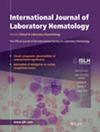Variant-specific BCR::ABL1 quantification discrepancy in chronic myeloid leukemia
Abstract
Introduction
Accurate quantification of the BCR::ABL1 fusion gene in whole blood is pivotal for the clinical management of chronic myeloid leukemia (CML) patients. The fusion protein encoded by BCR::ABL1 can vary in size, depending on the BCR and/or ABL1 gene breakpoint. The vast majority of CML patients have a p210 BCR::ABL1 fusion gene (M-BCR), which can be attributed to the presence of either e14a2 (b3a2) or e13a2 (b2a2) mRNA transcript junctions.
Methods
Twenty-five CML samples were analyzed in two different ISO15189-accredited centers that both use an Europe Against Cancer-based quantitative polymerase chain reaction (qPCR) protocol. Reanalysis of the sample set with transcript-specific standard curves and digital droplet PCR (ddPCR) were performed.
Results
qPCR quantification revealed a significant (up to 1 log) difference specifically for the e13a2 transcript variant in contrast to e14a2 transcripts (Hodges–Lehman 4.29; p < 0.001). Reanalysis of the sample set with transcript-specific standard curves abolishes the initial transcript-specific difference (Hodges–Lehman 0.003; p = 0.8192). Comparison of transcript-specific qPCR results of both centers with ddPCR, an absolute quantification method, showed a statically significant association, especially in the lower range, indicating the clinical utility of transcript-specific or absolute quantification methods.
Conclusion
Our data show that differences between transcript-specific quantification might exist between centers, leading to potential clinical impact on the follow-up of CML patients. The use of transcript-specific standard curves for qPCR quantification, or absolute quantification, can significantly reduce these differences. Specific attention should be applied to the interpretation of quantification differences of CML patients that switch between diagnostic centers.

 求助内容:
求助内容: 应助结果提醒方式:
应助结果提醒方式:


